The Longest Night
This article first appeared in the March 2022 issue of Adventure Cyclist magazine.
In 1996, I sat in the middle of my tent in a nondescript field outside of Banja Luka, Bosnia, at 2:00 AM. I was scared. My heart pounded so loudly in my ears, I worried someone would hear it.
How did I get here?
When I left for a five-month bicycle trip in the Balkans in May of 1996, there seemed little chance I’d be able to cycle into Bosnia. Although the armed conflict was winding down, I questioned which borders were open and whether it was safe at all to venture there.
My commentaries from two separate five-month bike journeys in India (1994) and South Africa (1995) had aired on public radio station KUOW in Seattle. These ventures had taught me to trust my gut and explore places beyond my comfort zone. I lived by my mantra: Caution keeps you aware. Fear keeps you away.
I flew into and pedaled out of Budapest in May. The first three weeks were the stuff of a bicycle vacation: a ride along Lake Balaton, sleeping among spring flowers, an invitation to a wedding in Slovenia, camping at a nudist resort on the Island of Krk in Croatia.
The trip took a turn out of vacationland when I decided to climb a dirt road that switchbacked up into the mountains rather than take the main highway along the Adriatic Sea.
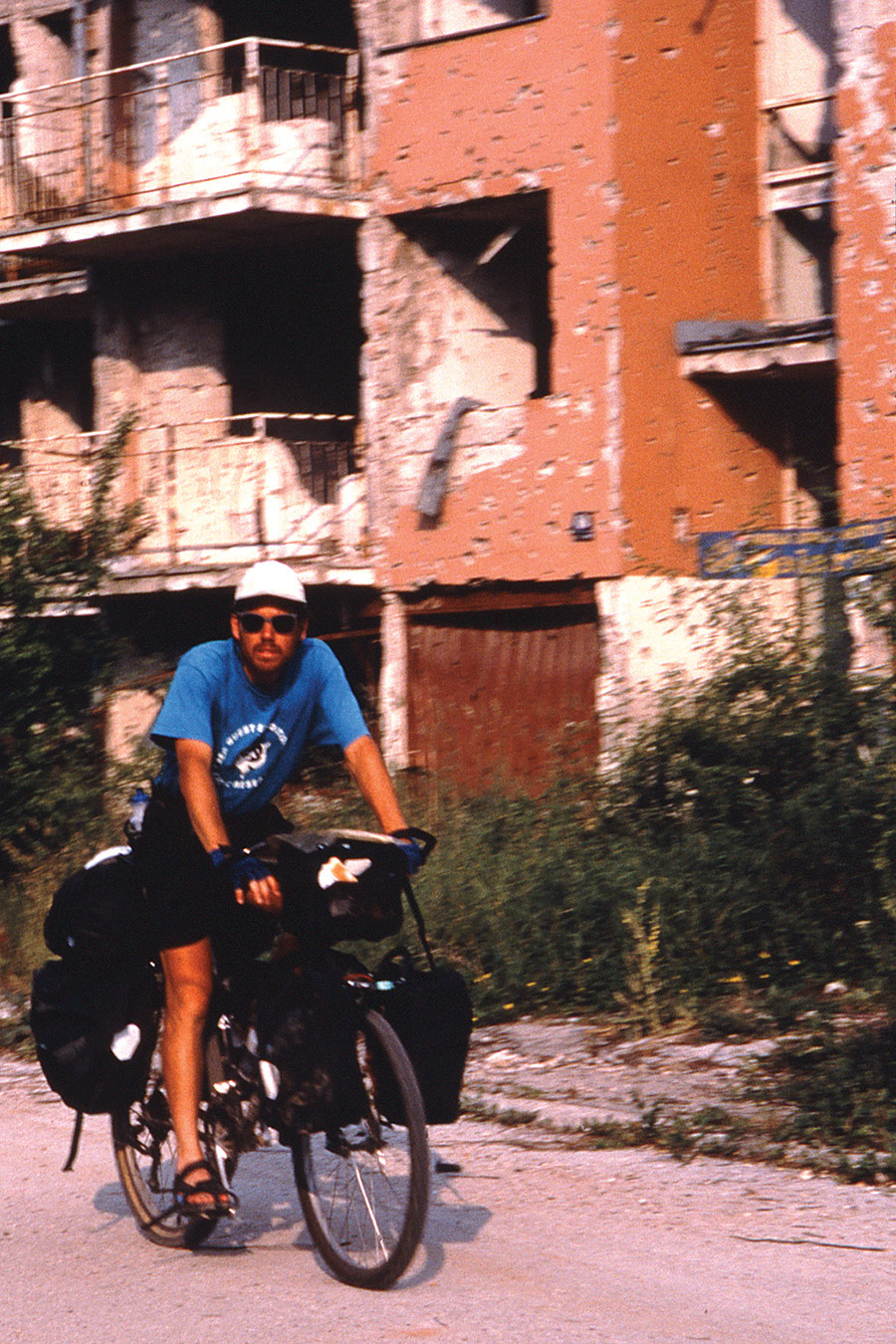
At the top, I met two locals who went by Mosquito and Su. Mosquito was as skinny as Su was fat. They couldn’t believe a cyclist had traveled here. Su looked at me and said, “Seattle Man, you’re a freak. I like freaks.” Mosquito was about to head out on a hiking trip with his girlfriend through the Velebit Mountains where he had been a guide for many years. Except now his beloved mountains were littered with land mines. “Even though there is evil in the earth, I will always walk these mountains,” he said.
It appeared my only option was to turn around and head back to the highway. Su smiled at me, reached into his back pocket, and pulled out a hand-drawn map of the road headed east. “Seattle Man, this is my gift to you,” he said. “The world needs more freaks.” The hand-drawn map showed locations of mines and the roads safe to travel.
Twenty-five years later, I’m not sure exactly why I chose to continue, except that I knew adventure wasn’t back on the main highway and my gut trusted this grizzled mountain man.
My journey took me though beautiful countryside filled with wildflowers, contrasted by bombed-out villages and abandoned tanks and cars littered with bullet holes. This was the path of Operation Storm, the largest European land battle since World War II.
I discovered that the Croatia-Bosnia border near the Catholic holy site of Me?ugorje was open and took the nearly deserted main highway through Mostar and on to Sarajevo.
The sniper barriers had recently been removed, and the residents of Sarajevo were enjoying being able to walk around in public without fear. I stood in the rubble of the National Library, tears running down my face.
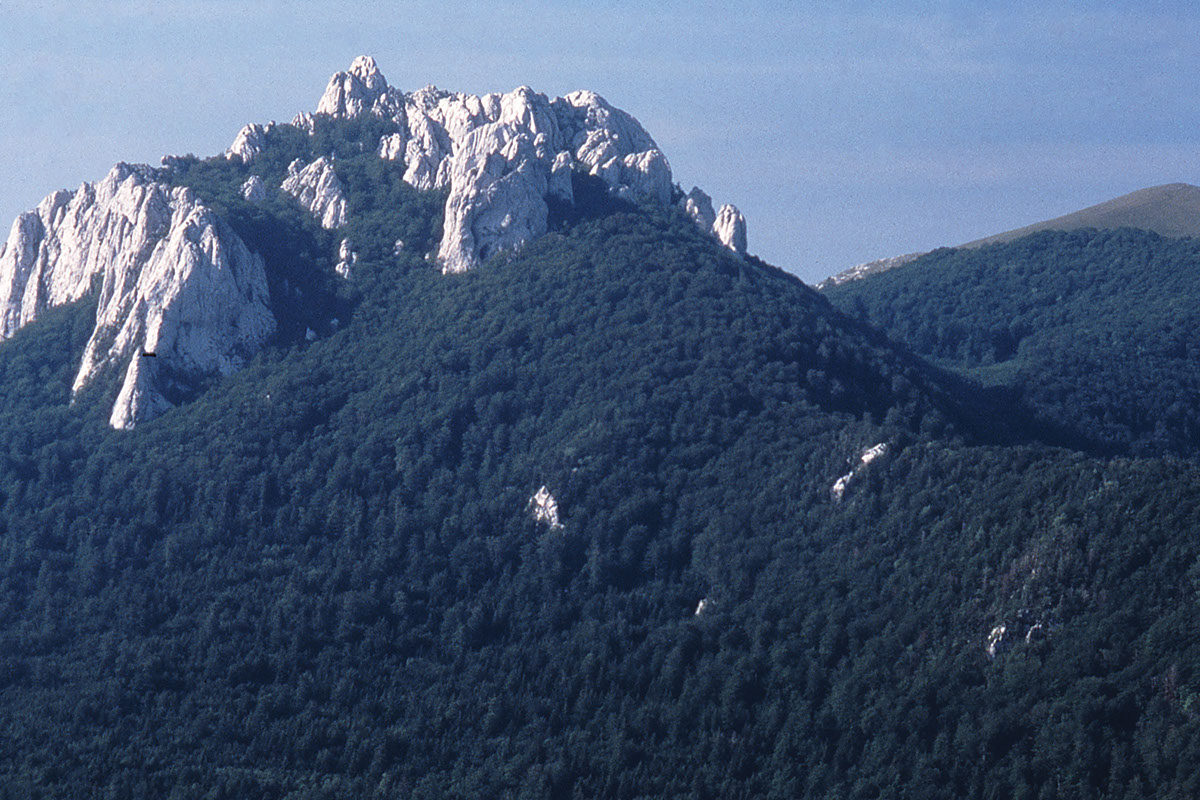
I came upon the Markale market I had seen in news reports. Rocket attacks in ’94 and ’95 had killed over a hundred people. The market was celebrating its reopening, and a news crew was filming the event. I noticed that the man holding the boom mike was wearing a Seattle Mariners hat (my home team). I caught his attention and shouted, “Go Mariners!” He flipped me off.
After they were finished filming, he wandered over and asked where I was from.
“Seattle,” I said.
“How did you get here?” he asked.
“By bicycle.”
“The F$%# you did.”
I described the route I’d taken.
“You’re crazy, dude.”
“I’ve been told I’m a freak, actually.”
“Can we do a story on you?”
“Sure. But only on one condition: I get access to your fax line to send copy to KUOW in Seattle.”
It was a deal.
Here is where I learned a lesson about how news often works.
In my mind, the story was about the market reopening and the citizens of Sarajevo being able to live closer to normal lives.
Instead, he passed me on to another crew (which included a war-experienced cameraman) to one of the most devastated neighborhoods in the city. The buildings were pockmarked with shrapnel and bullet holes. This area had been in the line of fire and was so dangerous that many victims of the rocket and sniper attacks were buried in home gardens rather than risk travel to a graveyard.
The cameraman got out of his truck and said, “I’m going to pull around that corner and film you pedaling down this street. You will ride ONLY in the middle. You see that to the right?” He pointed to an object at the edge of the pavement 50 meters away. “That’s a live munition. There are others. Do you understand?”
We did two runs. He got his footage: a bike traveler pedaling through the carnage of war. An Associated Press photographer asked if he could snap shots as well. He had one of the AP’s first digital cameras. It was big and clunky, and expensive. Today your bargain cell phone would take a better photo. He told me the images would be out on the wire within minutes. In 1996, this was magic.
The man in the Seattle Mariners cap talked with me after the shoot.
“You’ve been crazy enough to pedal to Sarajevo. Why not continue to Serb-controlled Banja Luka?”
It was a dare. I took it.
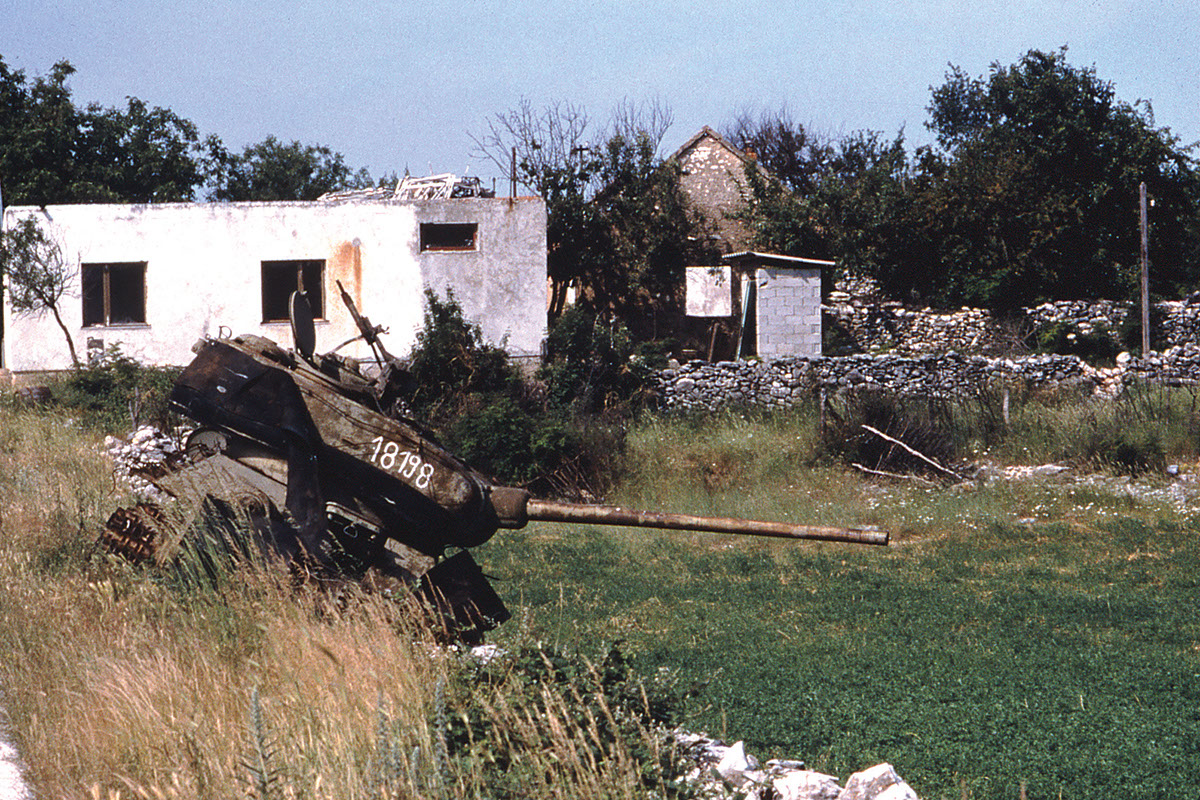
There was something intoxicating about pushing the envelope. It was a rush to have NATO uniformed soldiers in troop trucks ask me about towns and cities I’d pedaled through because they were restricted to small sectors of the country.
It was a two-day pedal to Banja Luka. The highway was mostly empty except for troop trucks and an occasional tank. I camped in some woods near the side of the road the first night.
As I approached Banja Luka, it dawned on me that I had no plan — no idea what I was doing or where I was going to stay. I suddenly felt very out of my league.
Then the bike travel magic happened.
“Hello,” a gray-haired man called out to me from a porch of a small home.
He didn’t speak a lot of English, but it was apparent that he had seen the TV news report featuring me pedaling in Sarajevo.
He invited me (and my bicycle) inside. He offered me some bread and some beer. I was able to communicate that I was looking for a place to stay that evening. He gestured to his tiny garden out back with a small plum tree. I could pitch my tent there … or just sleep on his couch.
Perfect. My anxiety vanished. I was going to be okay. You see? It always works out.
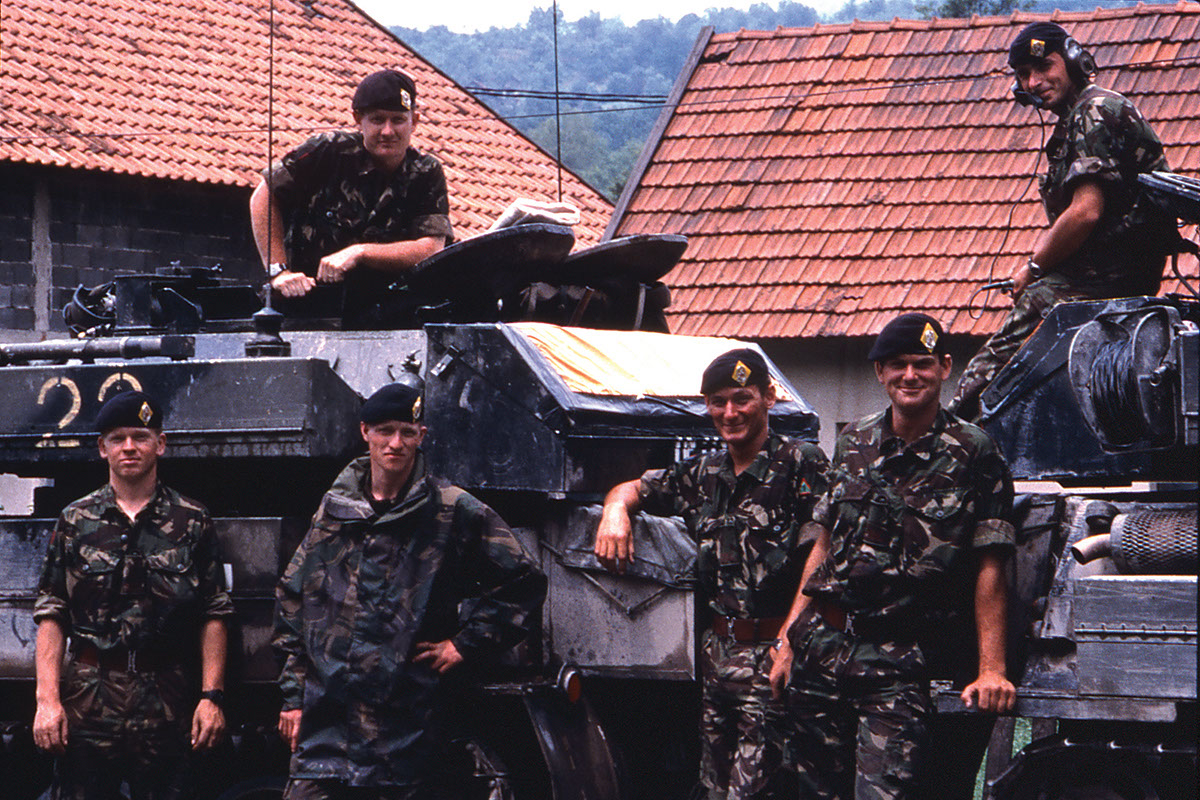
About a half-hour later, a friend of his dropped by. He was a burly fellow in his 60s, wearing black pants and a camo jacket. He spoke a little English. A bottle of plum brandy emerged, and we toasted and laughed about … I’m not really sure what. But we were all having a good time, and I had a safe place to stay the night.
What a story to tell. Getting drunk with a couple of old guys in Bosnia.
At around 11:00 PM, the friend asked where I was staying, and my host pointed to his couch.
The mood in the room suddenly grew dark.
No. This was not possible. If the police did a check and discovered me, my host would be in serious trouble.
My safe house disappeared. I was too drunk to rationally protest. Minutes later, I found myself putting my bike and gear in the back of a truck, and the friend drove me up into the hills. We stopped on the edge of a field and the man explained to me in broken English, “You camp here. No worry. My friends take care of you.”
And then he drove off.
The first mosquito bites drove me to action. Due to my inebriation, they had quite a feast before I was finished stowing my panniers in the tent. I sat upright, looking out through the mesh screen at a moonlit night.
“What just happened?”
“Where and why am I here?”
I had seen enough bad movies that the phrase, “My friends will take care of you” took on the ominous meaning that this was perhaps my last night on earth.
What a way to end a life of travel and adventure. Murdered in a field.
Caution keeps you aware. Fear keeps you away.
This had served me well. In Mexico, where my biggest fear had been not speaking the language, that fear had all but evaporated after three days of social interaction. Without this mantra, I probably wouldn’t have managed a single day (let alone five months) of pedaling through and out of New Delhi, India, without giving up. The same with South Africa the year after Nelson Mandela had been elected president. I called it my Fear and Hospitality tour. I had never been told so many times by so many people that I was going to die … while receiving some of the world’s most gracious hospitality.
But staring out into the darkness from my tent, I was terrified. I hadn’t been cautious on this trip. I was a seasoned traveler, the crazy cyclist who was pedaling lonely roads and highways patrolled by tanks and troop trucks. And the soldiers (Americans, Italians, Hungarians, Brits) were impressed and shocked to find a bike traveler on the road. That had given me a sense of bravado, and a false sense of security.
There is another phrase I was living: Ignorance is bliss.
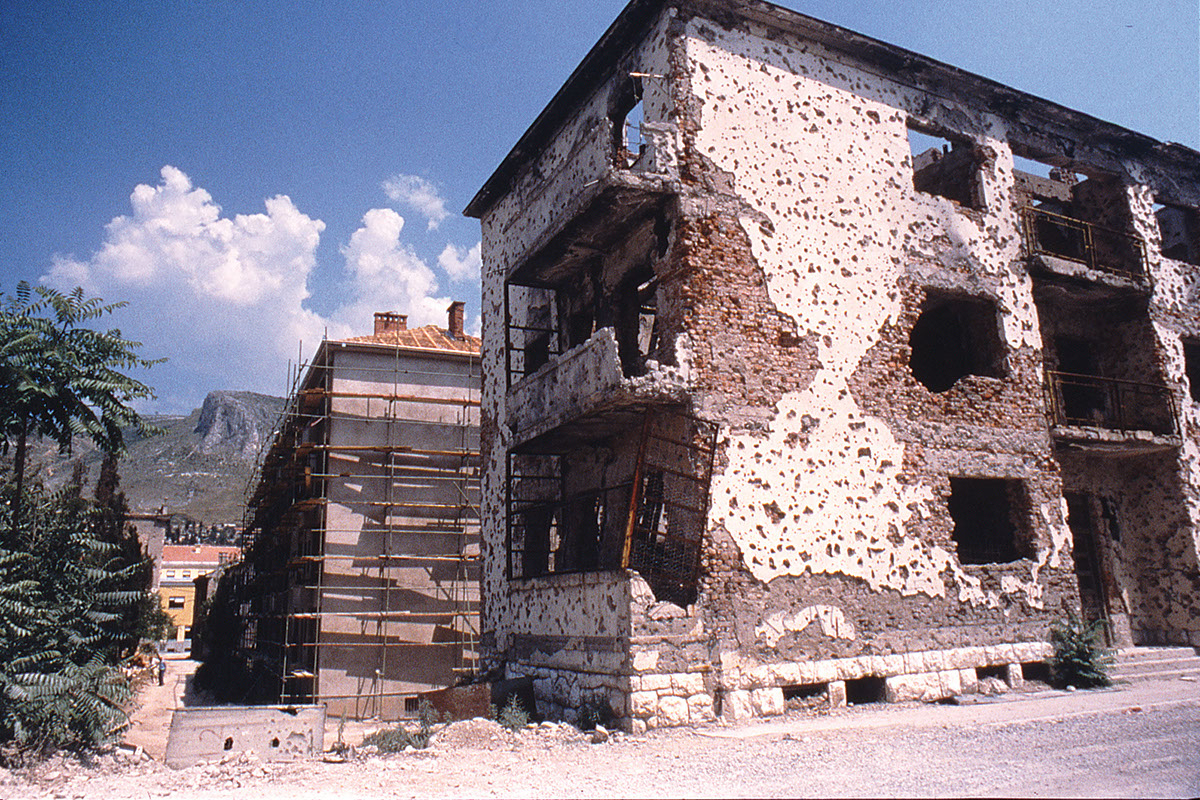
There had been two incidents in the last week of that trip I had laughed off. One had been in a little Serbian village in Croatia. There were bombed-out tanks and cars. Every building had been ransacked. There wasn’t a living soul for miles. I walked into a church and recorded a commentary that later aired on public radio. I was told by some international troops I met the next day that many of the buildings had been booby trapped before the residents fled.
Once I entered Bosnia, I was warned to only travel on highways named after birds: Sparrow, Vulture, Finch. These roads had been cleared of mines. I followed their advice. But the highways were lonely and wide. There was a tiny road on my map, only about two kilometers long, which looped on and off the main highway. There were houses that looked lived in. Why not? Fifty meters into my ride, the door of a house on the hill burst open and a man ran out onto the porch and screamed while waving his arms, “Mee-nay, mee-nay!” The word for mine has two syllables in many parts of the world. I froze. And then I slowly backed my bike onto the bird-named highway.
Yes. Ignorance may indeed be bliss. But sometimes it’s just stupidity.
There were other foolish incidents that replayed themselves that night, but those are the two I can remember. Why didn’t I write about these experiences at the time? Well, I was enjoying the image of being a responsible bicycle correspondent, and those stories didn’t fit the mold.
Now, at the age of 60, I might have approached the stories very differently. But, at 60, I probably would have avoided the region altogether.
It was the longest night of the entire arc of my travel career. I never lay down; I just remained sitting at the entrance, gazing out into the darkness through the mosquito mesh. I remember hearing frogs … and my beating heart.
And after an eternity, the sunrise revealed my surroundings. No one was waiting to harm me. No one at all. I’d been gifted another day.
I packed up my tent and pedaled on.


